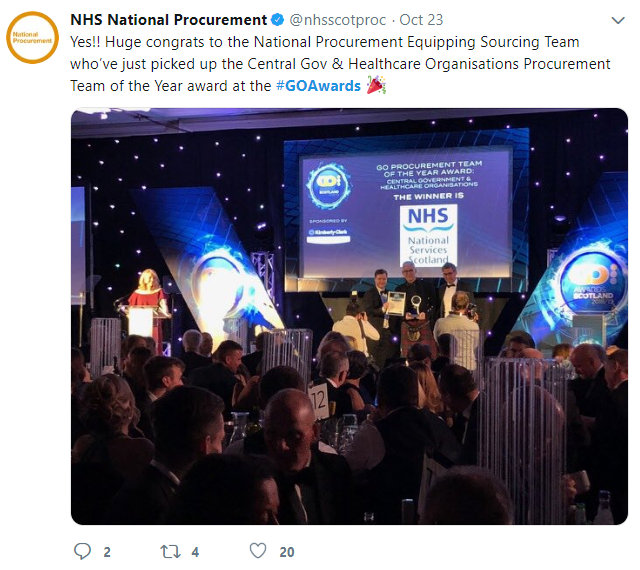
Finalists took to the stage at the prestigious GO Awards Scotland 2018 event at Glasgow’s Marriott Hotel on 23 October 2018, to celebrate the people behind the country’s procurement success.
Among the guests were public sector buyers and their suppliers, continuing conversations that started earlier that day at Procurex Scotland, held in the SEC Glasgow.
This year, the GO Awards ceremony formed the glittering climax to Scotland’s Festival of Procurement and welcomed over 500 delegates from the Scottish public procurement community and its suppliers, who went head to head to win a coveted GO Award.
The GO Awards ceremony was hosted by BBC Scotland presenter Catriona Renton, who guided guests through the evening of presentations. Her first acknowledgement was of the hard work of this year’s judges:
Ainslie McLaughlin – Director of Procurement and Commercial, Scottish Government
Nikki Bell – Head of Commercial Policy & Project Assurance, Scottish Government
Martin Street – Strategic Sourcing Director, NHS National Services Scotland
Hugh Carr – Head of Strategic Procurement, Scotland Excel
Stephen Richardson – Head of eSolutions & CIO, APUC Ltd
Eddie Regan – Principal Procurement Consultant, PASS
The judging panel had to select winners and highly commended entrants from organisations across Scotland in twelve categories. Winners were announced in the following categories:
GO Best Service Award: Medium & Large Organisations – Warmworks Scotland
GO Best Service Award: Micro and Small Businesses and Third Sector Organisations – Re-Tek UK Ltd
GO Infrastructure Project of the Year Award – Transport Scotland (For entry: Forth Replacement Crossing)
GO Procurement Innovation of the Year Award: Taking the procurement function forward – University of Strathclyde, DHI, NHS NSS, Scottish Government
GO Procurement Leadership of the Year Award – Angus Council
GO Procurement Project of the &ear award (above £20m value) – Police Scotland
GO Procurement Project of the Year award (sub-£20m value) – Renfrewshire Council
GO Procurement Team of the Year Award: Central Government & Healthcare Organisations – NHS Scotland National Procurement Equipping Sourcing Team, working with NSS Health Facilities Scotland Equipping Team
GO Procurement Team of the Year Award: Local Government & Other Organisations – University of Strathclyde
GO Social and Community Benefit in Procurement Award Other Organisations – University of Edinburgh
GO Social and Community Benefit in Procurement Award: Central Government & Local Authorities – Scottish Government – SG Procurement, Contract Management & Capability Team
GO Emerging Procurement Talent Award – Scotland Excel
GO Excellence Scotland Award 2018/19 – Transport Scotland (For entry: Forth Replacement Crossing)

The GO Awards Scotland Excellence Award was new for 2018/19 and, unlike the other categories, applicants cannot enter – as it recognises the very best overall submission drawn from each of the winners in this year’s Awards.
This category recognised the best of the best and the submission that most clearly demonstrated progress, innovation and achievement was the winner Transport Scotland for the Forth Replacement Crossing project.
When the Excellence Award was presented, Ms Renton praised the winner for all their effort:
“Congratulations to the team at Transport Scotland for their work on a now iconic Scottish structure. An outstanding achievement given the overall quality of this year’s Awards – a job very well done.”
Overall, the event was a tremendous success as guests also enjoyed a three-course meal and entertainment from celebrity magician Paul Martin.
Grahame Steed, Business Intelligence and eSourcing Director at BiP Solutions (event organiser) and GO Awards host, said:
“It’s been another tremendous year for the GO Awards Scotland, with many new entrants and returning organisations playing their part in driving up standards and innovation within public procurement. Well done to each of our finalists, and congratulations to those who have received one of the highly coveted GO Awards trophies – we look forward to even more competition next year!”

BiP would like to thank their event partner the Scottish Government and this year’s main event sponsors Orbis, Pertemps, Drummond Bridge, Pulsant and Simon Driscoll Consultancy Ltd.
To learn more about the National GO Awards National 2018/19, visit the GO Awards
The post GO Awards Scotland 2018/19: Celebrating Excellence in Public Procurement appeared first on BiP Solutions.









